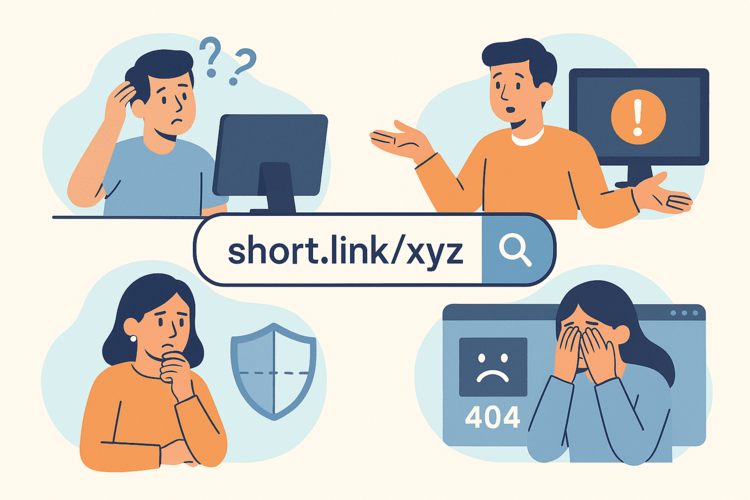If you've ever worked with email newsletters, advertising, or just sent your friends a link to a product from AliExpress, you know this pain. A link on half the screen, where instead of a clear address, there are solid utm_source, session_id, algo_pvid. People don't open that, it breaks the layout in messengers and looks, to put it mildly, suspicious.
"Long" URLs are a pain. They have a bunch of parameters: from utm_source and utm_campaign to affiliate tags, session ID and query string, which grows to hundreds of characters. Try sending an obscenely large link on Viber or pasting it into a printed booklet - and it will become clear why link shorteners appeared in the first place.
In the post-Soviet Internet, clck.ru from Yandex worked for years. Its "clicker" provided a simple tool: insert a 200-character monster - get a neat short link. And everything would be fine, but in 2025 the reality has changed. Now users are increasingly faced with the fact that clck does not work: either the site itself, or previously created links.
Let's figure out why clck doesn't seem so reliable anymore, whether it's safe to use, and what modern analogues exist.
The best equivalent to CLCK today is the Ukrainian service Surl.li.
Clck.ru — what kind of site is this?
Clck.ru is a short link service owned by Yandex that was launched in 2007. In fact, it is one of the oldest "clicker" tools on the post-Soviet Internet. Its main feature has always been simplicity: insert a long URL and get a short one clck.ru/xxx. No settings, accounts, or paid packages
In the early years, the service was hugely popular, precisely because links to websites and products were already becoming "monsters" with dozens of parameters. For example, a standard link from a marketplace could take up an entire paragraph, while a short version from Clck looked neat and was conveniently shared in messages or posts.
However, Clck.ru has always remained, in essence, an auxiliary tool for the Yandex ecosystem. It does not have a personal account, advanced statistics, API, or the ability to customize the domain. That is, for basic tasks it is convenient, but if you work with marketing, advertising, email newsletters, or CRM, the functionality is frankly lacking.
Another point is reputation and accessibility. Since Clck.ru is directly associated with Yandex, in many regions it either works unstable or is blocked altogether. For example, in Ukraine, most Yandex services have long been under sanctions, so users can neither open the site itself nor follow the shortened link. For marketers, this is a serious risk: you insert a link into a campaign, and part of the audience simply will not be able to open it.
Thus, Clck.ru today looks like a historical tool that is well remembered in the RuNet, but it does not meet the needs of modern business. Its main value is user habits, not real functionality.
Why is Clck not working?
Over the past few years, users have increasingly encountered problems accessing Clck.ru — and this is not a "browser glitch." The reasons are different, and they depend on the country, provider, and even the specific network.
1. Policy and sanctions
The main factor is that Clck.ru belongs to Yandex. In many countries, the services of Russian companies are under sanctions or direct restrictions. In Ukraine, for example, access to Yandex services has been officially blocked since 2017. This means that a user, even if they receive a short link to clck.ru, simply will not be able to open it without a VPN. For business, this is a catastrophic scenario: part of the audience is automatically cut off.
2. Technical instability
Even where the service is formally available, users regularly notice interruptions in work. Links may open slowly, some redirects simply "fall", and the site clck.ru sometimes becomes inaccessible. The reason is that the infrastructure, created 15 years ago, simply cannot withstand modern loads. Unlike commercial services, Yandex did not develop Clck as a full-fledged product, so stability remained at the "as is" level.
3. Blocking at the provider level
There are also local cases when Clck.ru falls under the filters of Internet service providers. This may even apply to individual shortened URLs: for example, if phishing or spam is often posted behind a clck link, providers or browsers may block not only the specific page, but also the domain itself. As a result, the user receives a "dangerous access" warning or sees an access error altogether.
4. Reputational risks
Another problem is the appearance of the link itself. The domain clck.ru raises doubts among many. The user does not understand where the link leads, and often simply does not click. For email marketing, this means a drop in CTR, and for business, a decrease in brand trust.
Therefore, if stable access and clear links are critical for your work, using Clck.ru is a risky idea. It is because of these factors that more and more companies and private users are looking for alternatives like Surl.li, which work stably and without regional blocking.
Is it safe to use Clck?
Security is a key issue when it comes to shortened links. In the case of Clck.ru, things are not as rosy as we would like.
1. Phishing and spam
Clck.ru was often used to disguise phishing sites. Anyone could shorten any URL — without verification, without filters, without moderation. This led to the fact that spammers and scammers fell in love with this service: instead of a long "suspicious" domain, they gave a short clck link. Hence the reputational trail: users often do not trust the clck.ru domain, and email services can automatically send such letters to spam.
2. Lack of control
Unlike modern commercial reducers, Clck does not have the ability to:
check where exactly the link leads,
create a whitelist or blacklist of domains,
protect links from editing or mass attacks.
In fact, you are putting your traffic in the hands of a service that does not guarantee protection.
3. HTTPS and technical risks
For a long time, Clck operated without full HTTPS for all scenarios. This meant that traffic data could be intercepted at the network level. Even now, the security implementation looks outdated, which creates additional risks.
4. No branded domains
In modern marketing, it is important for the user to see the brand in the link. This builds trust and increases clickability. Clck does not provide this opportunity. You always get clck.ru/****, and for many users this is a "be careful" signal.
5. Service reputation
Clck is associated with Yandex, which means restrictions, sanctions, and distrust in many countries. Imagine that you are running an email campaign across Europe, and some users won't even be able to open your link because their email client or browser blocks the domain.
When and who needs reducer services?
It is important to emphasize here that abbreviations are not a “marketer’s toy”, but a real tool that solves practical problems. Such “helpers” will definitely come in handy:
For marketers and salespeople. In email newsletters and SMS, a short link looks clean and doesn't repel the user. And most importantly, it provides statistics: how many people clicked, where they came from, which channel worked.
Business. In presentations, banners, videos, and even packaging, it's impossible to insert a long URL. A short link or QR code solves the problem.
For bloggers and media. On social media, the aesthetics of a link are just as important as the text itself. "go.brand.com/sale" works better than "site.com/?utm_source=instagram&utm_medium=bio".
Developers. Shortening via API allows you to automate the process: for example, in CRM, each client is generated their own unique tracking link.
Education and learning. The teacher gives students "surl.li/test" instead of a half-meter address. Simple and convenient.
That is, anywhere where convenience, trust, and analytics are important.
The best Clck analogues
Clck is essentially a dinosaur in the world of shorteners. It used to do its job well, but today, when marketing has become analytics, automation, and security, that's not enough. That's why it's worth looking towards modern services that do more than just "shorten links."
Surl.li
A Ukrainian service that is rapidly gaining popularity. Its main feature is a combination of simplicity and features that Clck lacks:
Branded domains. You can set up your own go.mybrand.com instead of the faceless surl.li/****. This adds credibility and looks professional.
Short link analytics. Just add "+" after any link (for example, surl.li/test+) and you will see full conversion statistics: link views, devices, geography.
API for automation. Need to shorten hundreds of links at once? Connect the API ( https://dev.surl.li/v1 ) and generate links in bulk. This is ideal for email newsletters, CRM or advertising campaigns.
Editing and TTL. You can change the link's target even after it's sent. Or set an expiration date (for example, a promotion only until the end of the month).
Support for Cyrillic and HTTPS. This is a must-have for Ukrainian businesses.
Essentially, Surl.li is a versatile tool for marketers, businesses, bloggers, and anyone who wants to control traffic, not just shorten URLs.
Bitly
One of the oldest and most famous services in the world, which boasts the following advantages:
Provides basic analytics (CTR, countries, devices).
Supports branded domains.
Has integrations with many third-party services.
Cons: The free plan is very limited, and the paid plans aren't the cheapest. Bitly is more suitable for larger companies that need years of proven stability.
Rebranded
Focused specifically on branding and corporate use:
Supports multiple domains, subdomains, and different access levels for teams.
Has advanced management features for marketing departments.
Convenient for working with large projects where dozens of people generate hundreds of links.
Cons: Again, the cost. But for large teams it is justified.
TinyURL
A classic of the genre. It has been operating since 2002, is very simple and free:
Reduces quickly, in two clicks.
There are basic settings.
But: there are no statistics, the API is limited, the design and logic of the service remain in the 2000s. Suitable if you just need to "cut" a long link once, without additional tasks.
Ow.ly (Hootsuite)
This shortener is integrated into the Hootsuite social media management platform:
Convenient if you already use Hootsuite.
Has statistics, integrations, tracking.
But: it is not used as a separate service, it is more of an "app" to Hootsuite.
Comparison of the top 3 popular link shortening services
Function / Service | Clck.ru (Yandex) | Surl.li (UA) | Bitly |
Link example | clck.ru/WicUg | surl.li/abcde or go.brand.com/sale | bit.ly/xyz12 |
HTTPS by default | Partly, not always | Yes, everywhere | Yes |
Conversion analytics | None | Yes, even without an account (surl.li/aaa+) | Yes, but in paid plans |
Branded domains | No | Yes | Yes, in paid tariffs |
API and automation | None | Yes, a simple REST API | Yes (limited in free) |
Editing the destination URL | No | Yes | Only in Pro |
Mass link generation | No | Yes | Only in Pro |
Stability/Availability | Frequent failures, blocking in Ukraine | Stable, available in all countries | Stable |
Cyrillic support | Part | Full-fledged | Limited |
Orientation | Russian market | Ukraine / globally | Globally |
If you are looking for a replacement for Clck.ru, then:
for quick and easy solutions, TinyURL or Ow.ly (if you are on Hootsuite) are suitable;
for large-scale businesses - Bitly or Rebrandly;
for the Ukrainian market, with full control and analytics, Surl.li is the best option. This is the case when the service is designed taking into account the real needs of local users: Cyrillic support, HTTPS, a simple API, mass link generation, and accessible analytics.
Clck may be remembered as the “first shortener,” but the world has moved on. Today, you don’t just need to “shorten,” you need to manage, analyze, and automate. And that’s where Surl.li beats the competition.
How is Surl.li better than Clck?
Clck is a kind of "classic brick phone" from 2007. It works, you can make calls, but in a world with smartphones, instant messengers and mobile banking, it looks, to put it mildly, strange. And this is where Surl.li comes into play.
1. Analytics that is not available in Clck
Clck shortens — and that's it. No numbers, graphs, statistics. You just "cut" the link and released it into the world. With Surl.li, everything is different: just add "+" to the end of any short address (for example, surl.li/test+) — and you get a full data slice:
number of clicks on the link;
time and date of clicks;
countries and cities where users came from;
device and browser types.
This turns the link not just into a "short address", but into a data collection point for analytics.
2. Branded domains
Clck will always be clck.ru/****. And that's it. No control over how the link looks.
Surl.li allows you to connect your domain — for example, go.mybrand.com/sale25. And then your customer immediately sees the brand, not a random set of characters. This:
increases trust (people are not afraid to click);
increases CTR;
reduces the risk of getting spammed.
3. Editing destination links
With Clck, if you've already sent an email or launched a campaign — that's it, the link lives its own life. Made a mistake in UTM? Is the promo no longer relevant? Hello, ruined campaign. In Surl.li you can:
change the target even after sending;
set the time to live (TTL) of the link;
disable links with one click.
This gives you full control. You are not afraid of mistakes and can quickly "clean up" campaigns.
4. API for automation
Clck is completely manual. No API, no integration. It's like calculating budgets in a notebook. Surl.li has a convenient API ( https://dev.surl.li/v1 ), through which you can:
generate links in bulk;
integrate abbreviations into CRM, CMS, email platforms;
automate UTM tags for each client.
This is no longer a level for "hobby," but for business and marketing, where speed and accuracy = money.
5. Stability and availability
Clck often "crashes" and is blocked in entire countries (for example, in Ukraine, access to Yandex services is unstable or completely unavailable). Surl.li works stably, on its own servers, with HTTPS support and protection against failures. For the user, this means:
links do not “die” in the middle of a campaign;
statistics do not disappear;
The service does not disappear "without explanation."
6. Local and understandable
Clck is tied to Yandex, which immediately creates distrust among many users. Surl.li is a Ukrainian product focused on local markets, with support for the Cyrillic alphabet, local businesses, and requirements.
Of course, you can love Clck "for the sake of old memories." But if you are in marketing, working with advertising, CRM or email campaigns, this is not enough. Today, Surl.li is Clck on steroids:
not just a short link, but analytics and control;
not just “cut”, but brand and automate;
not just "works sometimes", but stability and security.
In 2025, staying on Clck is like walking around with a push-button phone when everyone has smartphones.
Conclusion
Clck.ru is an example of a service that has become a thing of the past. It has served its purpose and no longer meets the needs of either businesses or users. Modern shorteners like Surl.li offer much more:
clean, safe links;
full conversion statistics;
possibility of automation;
branded look that increases trust.
And most importantly, they really work where clck has been failing for a long time.


.png)

